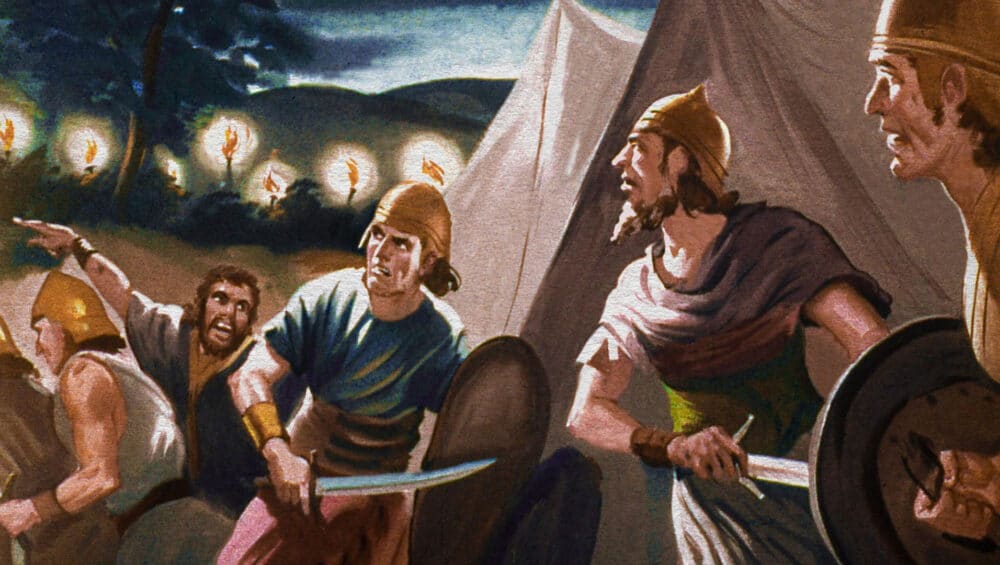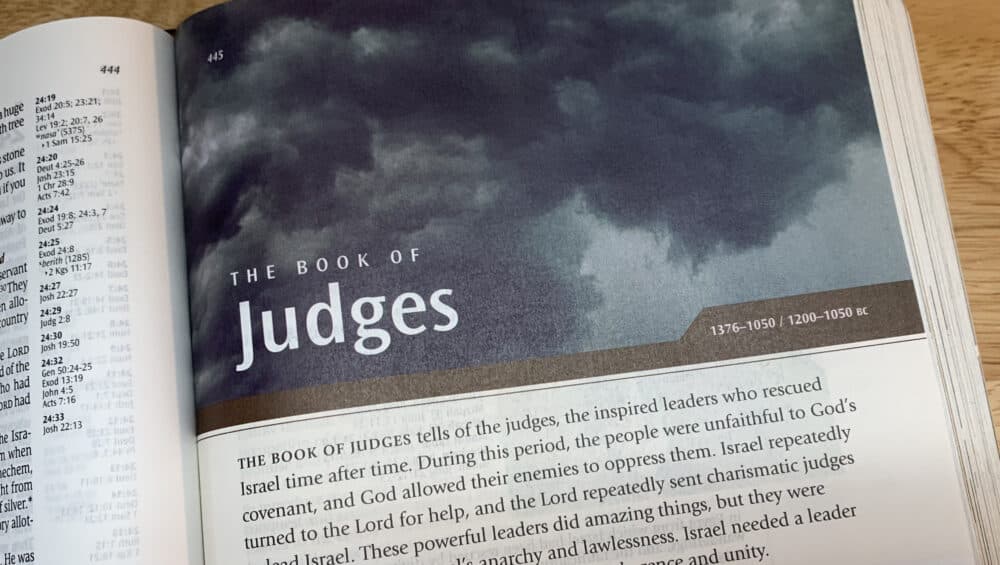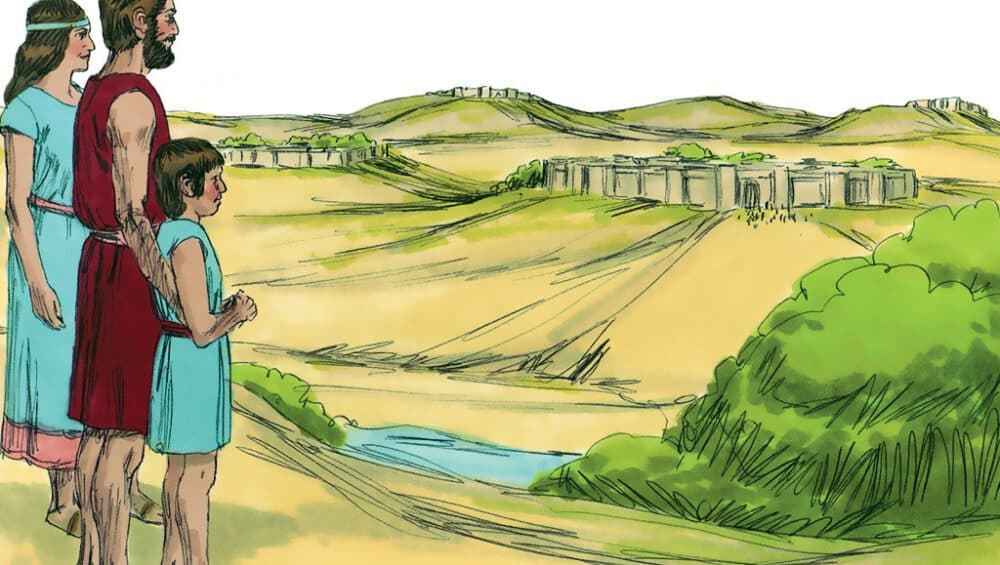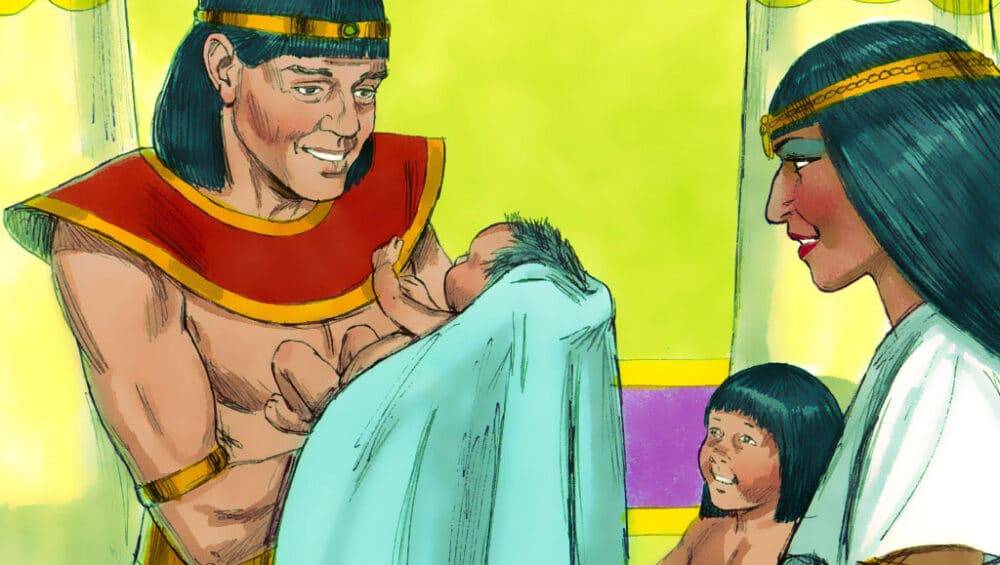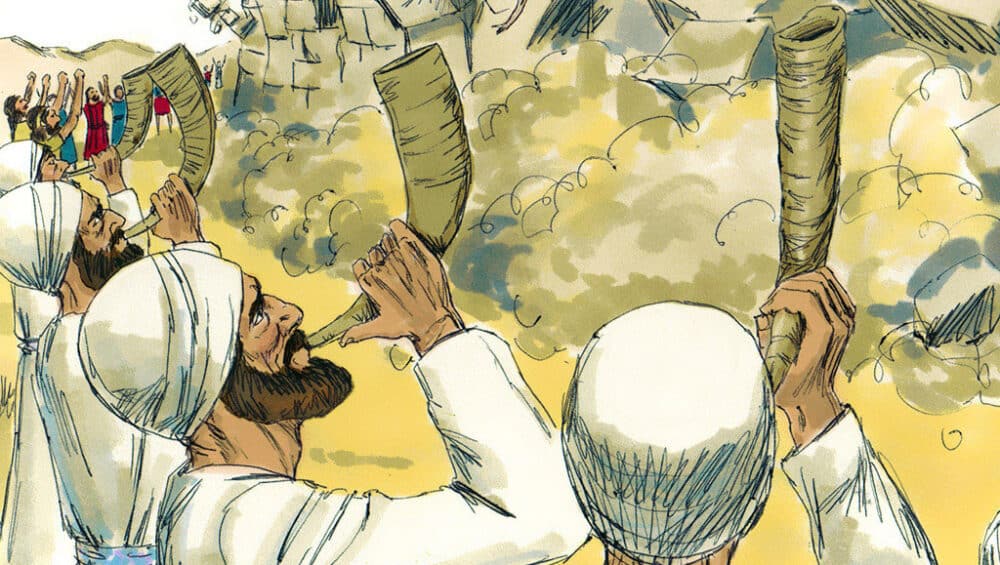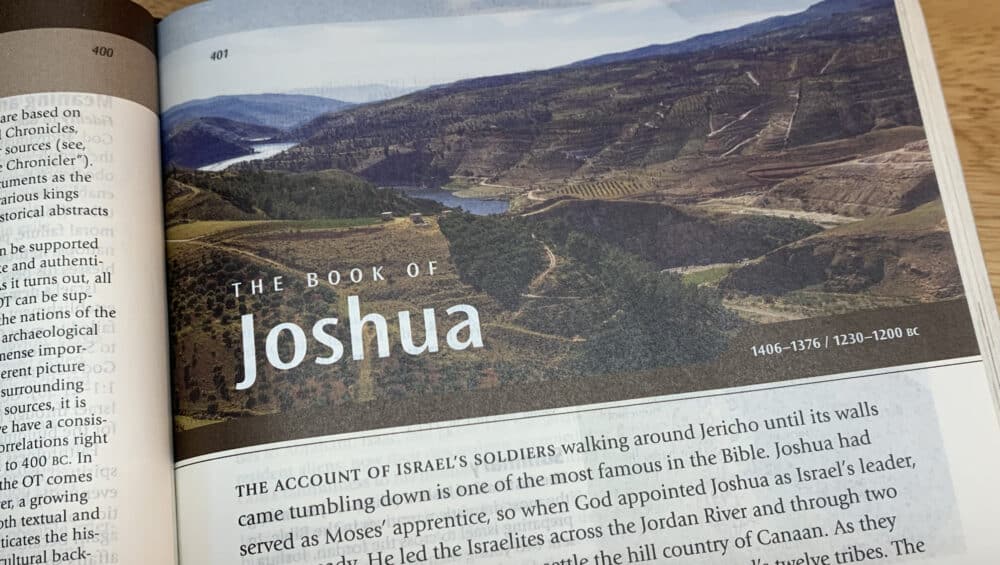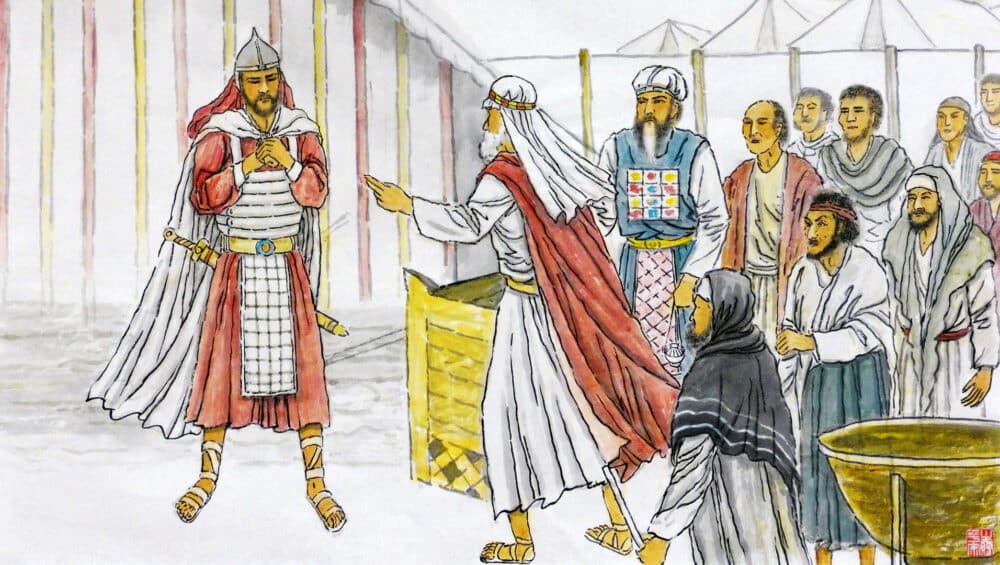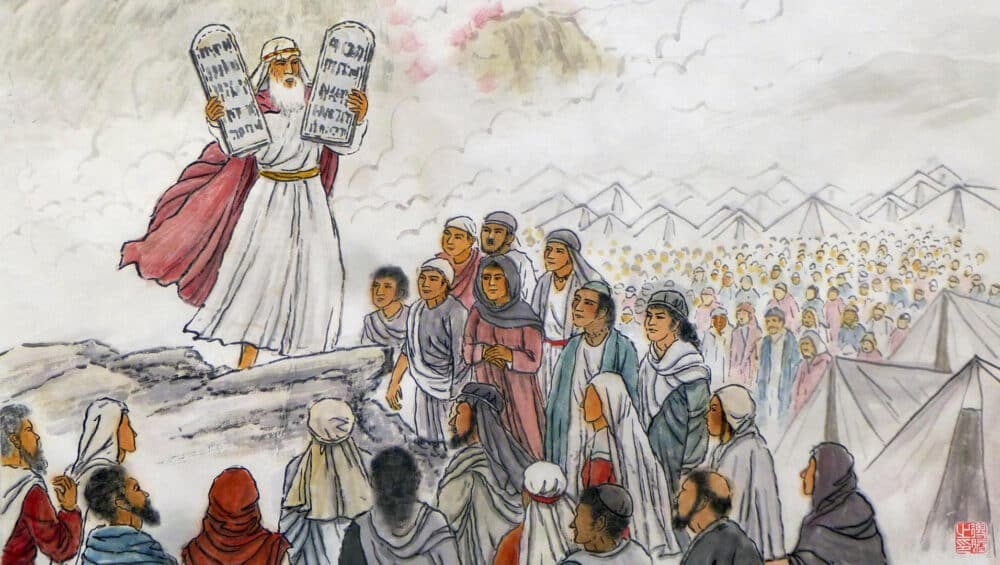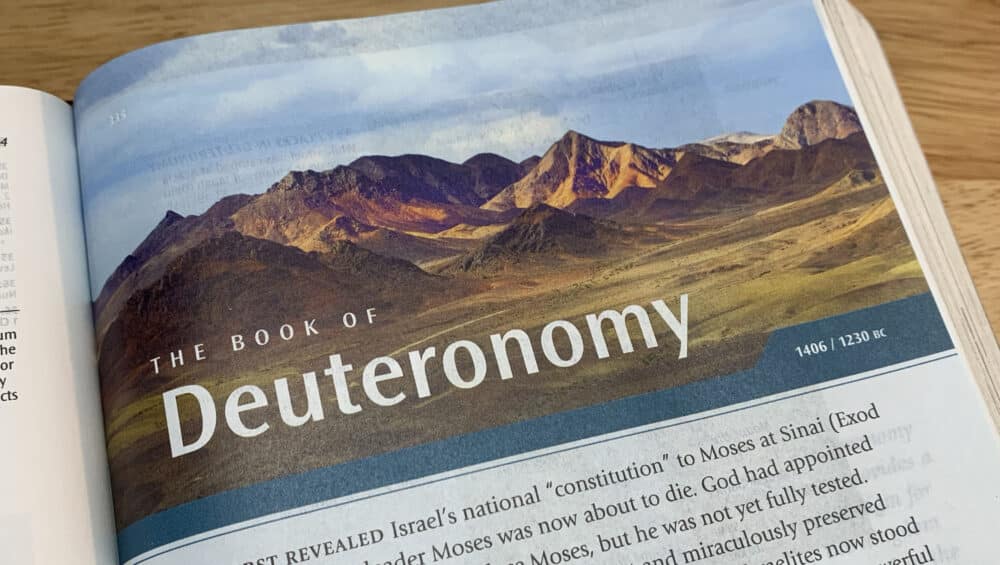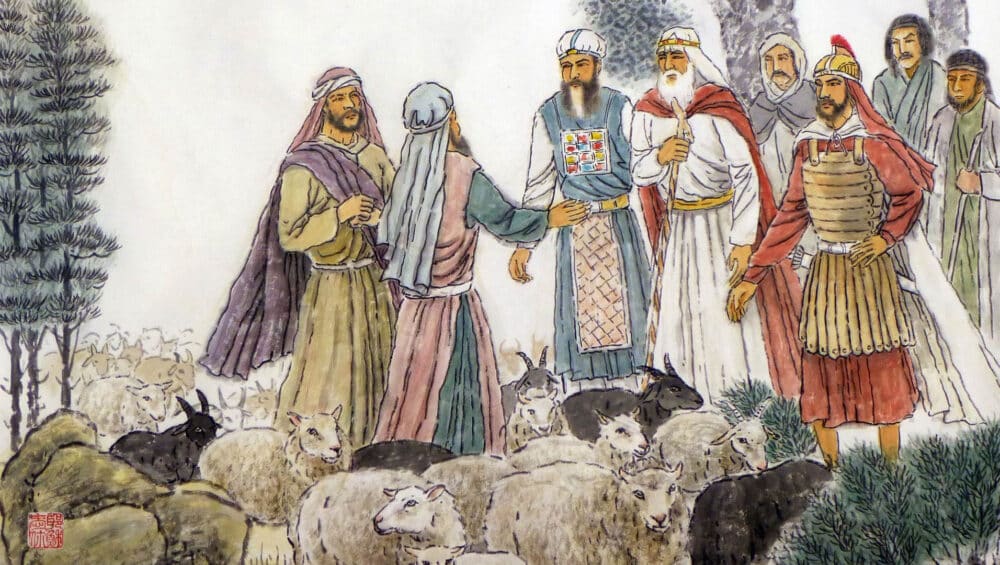Moody Publishers / FreeBibleimages.org
Welcome to Livin’ Light’s Bible-In-A-Year challenge of discovering God’s love for us and His purpose for our lives. Here is the format for this great adventure: The daily reading assignment is posted at 5 a.m. After each day’s reading, Leigh An Coplin, the blog host, shares observations and poses questions about difficult passages to Rob Fields, who studied Christian Education at Asbury Seminary and currently teaches Biology in the Orlando area. To start from the beginning, click on 365 Bible Readings and scroll down to Day 1. The reading schedule is taken from The One Year Chronological Bible NLT.
Today’s Reading
— Judges 7-9:21
(1169-29 BC) Click here for a timeline of the entire Bible.
Questions & Observations
Q. (Judges 7:3): What does this say about the resolve of the Israelites? There were 32,000, but only 10,000 were willing to fight? I see why the Israelites’ faith is a roller coaster with that many who have not committed to God.
A. Maybe it is talking about their eagerness to fight? But you have provided an apt description of their faith: a roller coaster suits it nicely.
Q. (Judges 7:4-6): I certainly understand why God wanted to thin out the Israelite army: to let them know that without God, they couldn’t possibly defeat anyone, especially with only 300 men. Do you have any comments as to why — or the significance of — God testing the Israelites by how they drank water?
A. I actually remember hearing a sermon on this: supposedly the men who drank by taking the water in their hands rather than stopping down to drink were the most seasoned veterans: they never took their eyes off of the battlefield. That is most likely your answer.
Q. (7:8): We have seen a lot of ram’s horns used. Why were they so important? I guess they were a way to make noise and gather folks together from afar.
A. The instrument referred to here is called a Shofar (read about it here: http://en.wikipedia.org/wiki/Shofar), made from the horn of a domestic animal that had a horn you could hollow out, usually a ram as mentioned. The instrument is first referred to in Exodus 19 when the presence of God causes great distress among the people. The horn was used for religious purposes, and still is today, to call the people to important festivals. The sound is quite loud and distinctive (listen to it here: https://www.youtube.com/watch?v=9dkEe3ph_bU) and would also have been very useful in battle to summon soldiers or intimidate the enemy, as it is used here.
Q. (7:10): I don’t know why God gave Gideon an act of assurance here. God is God and Gideon believed in Him. Why did he need some proof?
A. Apparently his self-doubt was strong: in the story God tells him to go “if he is still afraid.” Apparently he is.
Q. (7:18): So they included Gideon in their shout so the enemies would know that God is with Gideon giving him power?
A. I think they did that because Gideon was the commander of their force.
Q. (8:1-3): So is Gideon telling the people of Ephraim to not be upset that he didn’t call them to help, they should be rejoicing that God gave them a victory over Oreb and Zeeb? In other words, they need to feel joy for the win for all of Israel and not concern themselves what part they had in the victory?
A. I think that’s partly right. He’s also saying that he didn’t have much of a victory, and that he called the other tribes for the “good part” of the fighting — they got to spoil the conquered people.
Q. (8:4-21): Of course, the leaders of Succoth and Peniel should have fed Gideon’s army. I assume they knew that Gideon was fighting for the Lord. Is there something we should take from this, like always help a stranger or always help those who are doing good work?
A. I think the folks in Succoth and Peniel (where Jacob wrestled with God back in Genesis) were caught between two powerful warring tribes, and hedged their bets. They were concerned that if they supplied Gideon’s troops, they risked alienating the Midianites — or they may have been related — and if the Midianites won, there could have been repercussions against them. It looks to me like these towns were in a no win situation, and they probably should have just picked a side. In choosing neither, they lost either way.
O. (8:10): It’s truly amazing that 300 Israelites with the power of God could kill 120,000 warriors and capture the remaining 15,000.
Q. (8:23): Gideon sure shows an immense amount of faith and loyalty in the Lord. But, why did he make an ephod? In Moses’ days, the ephod was a design that God ordered, not a man. Was this an egotistical move of Gideon — similar to Joseph bragging about his dreams, which, in turn gave him the punishment of being sold as a slave and spending years in Pharaoh’s jail? Is this why a trap came to Gideon’s family as a result of the ephod? I don’t know what that means: a trap for Gideon and his family, especially because it goes on to say that the Israelites lived in peace for 40 years.
A. Gideon’s indulgence in taking the gold of his conquest and making the ephod (we’re not clear on exactly WHAT he created — it may have been something very different from what God had made for the high priest) would be the downfall of his family due to his son’s desire for power. I think that Gideon had it made to celebrate his own accomplishments, and also something to share with his town and family, but this was a poor decision. The 40 years of peace refers to outside invasions, not necessarily what was going on inside the nation. There was clearly prominent unrest among Gideon’s many descendants.
Q. (8:30, 31): What happened to the rules of a man should marry one woman? Here, the Bible says Gideon has many wives. Also, does God view a child that comes from a concubine as less than a wife? We saw this with Abraham too — that Isaac was favored over Ishmael.
A. While one man and one woman, Jesus tells us, is God’s IDEAL for marriage (Matthew 19:4), there were no particular laws regarding multiple wives (never multiple husbands) or concubines. Since concubines were, in a sense, promoted slaves, their children probably did not have the full status of the more “legitimate” wives. And it is important to note that just because God allows men to keep multiple wives (we wouldn’t have the 12 tribes of this nation without Jacob’s four wives- probably 2 wives and two concubines), it NEVER endorses this practice. God’s ideal remains one man and one woman.
The example you gave with Abraham is different because God had already promised Abraham a son VIA his wife Sarah. Hagar and Ishmael enter the picture because Sarah couldn’t wait and frankly didn’t believe God. I certainly think that Abraham thought Ishmael was just as much his son as Isaac, but God chose to carry on the line of Israel through Isaac, as He promised.
Q. (9:5): God seems to have a fondness of the youngest siblings. Here it is Jotham. Also, Joseph, Benjamin, and Jacob was actually the younger twin, I think.
A. Jacob/Israel was the younger twin to Esau, and Joseph and Benjamin were indeed Jacob’s favorite sons — and it appears God favored them as well. I would say that God tends to favor the least and the last. We will see this again with David in 1 Samuel. But also He tends to choose people who have a heart for Him alone, and can’t get by on their favored position — as firstborn son or similar — alone.
Q. (9:21): I would like to talk about when to trust God. Like Jotham knew his brother would kill him if he caught him. But, how much are we supposed to rely on God that He will take care of all things? Are we true Christians if we go to the doc and get treatment, or should we just rely on God to heal us? A lady I talked to last week was talking about what and when to teach certain things in the Bible to kids. She gave an example of Shadrick, Meshak and Abednego. They were thrown into a furnace, but they prayed and God protected them. She said she didn’t think that was appropriate for preschoolers because they could think that if they prayed to God to protect them that they could walk through a fire unharmed. She said if they walk into a fire, they are going to get burned.
A. Wow, way to save it for the end there. Shadrick, Meshack, and Abednego story is recorded in Daniel 3.
Regarding the teaching of that story to children, I guess I could see why you would want to avoid it, but it is one of the strongest Biblical examples of pure faith in the entire story. I would say that if you told the story correctly (and she did not for multiple reasons besides the names — read the story yourself and you’ll see what I mean), you would have no need to fear of your child walking through a campfire.
Regarding the VERY DIFFERENT issue of when to trust God, that is something that ultimately must be worked out between you and Him. There are various semi-church groups out there who argue that, as you mentioned, we should trust in God for faith healing and not seek modern medicine. However, many Christians have argued that God has given us minds to think and to solve problems, including problems that have plagued mankind for millennia: disease, recovery from injury, and other traumas. I have no problem with arguing that these provisions — antibiotics, immunizations, other drugs —are gifts from God to make our lives easier and less brutal. Frankly, modern society couldn’t exist without them. But these things are not the be-all-end-all: we will still face death, and to this point, there is no coming back from it (Easter events not withstanding). If we are without a relationship with God, then the drugs and attempts to prolong our life will literally be all we have left at the end. But if we do trust in God, ESPECIALLY in dying, then we will see that death is only a step — one that is necessary for God to complete His final work in us, just as He did with Jesus’ death.
We are celebrating the Easter season, and it is the very resurrection that we celebrate that personally gives me the courage to trust God no matter what. That doesn’t mean I don’t take advantage of modern medicine and efforts to be healthy, but I would most likely draw the line at prolonging my life simply for the sake of having it continue. I believe that there is more than this life alone. Ultimately, if I do not trust God with my eternity, then the decisions I make about vaccines or antibiotics will make little difference in the end. The Easter story is about God demonstrating His ability to conquer even death, and to show us that He is worthy of our trust, even in light of eternity.
For the curious: Could a jug found on an archeological dig be Gideon’s? It has his name on it. https://www.oneforisrael.org/bible-based-teaching-from-israel/name-of-gideon-found-on-judges-era-jug/
Shop: Christian shirts get noticed. Check out these conversation starters: https://livinlight.org/shop/
Tomorrow’s reading: Judges 9:22-11:28

